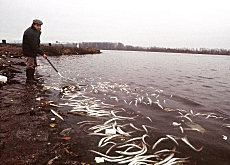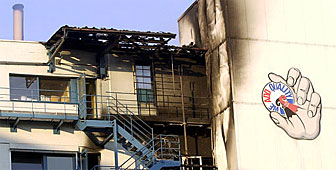Schweizerhalle still casts shadow 20 years on

Twenty years after a major environmental disaster in Basel, local people are aware that the city's key chemical industry still poses a risk.
And although residents have placed their trust in the industry again, doubts remain.
The environmental nightmare began after a fire broke out at a Sandoz company chemical warehouse at the Schweizerhalle industrial area outside of the city in the early hours of November 1, 1986.
As the warehouse went up in flames, the surrounding area was engulfed in a cloud of acrid and partly toxic gases.
The run-off from water used in fire fighting operations mixed with chemicals to become a contaminated cocktail that found its way into the River Rhine.
The pollution spread downriver, fish died in large numbers and abstraction of water had to be stopped as far away as the Netherlands.
“We remember being woken up by the steps of neighbours hastily walking around upstairs, doors slammed, windows being closed and people calling each others over balconies – then the sudden pungent smell of chemicals all over,” remembers Basel resident Barbara Fiedler.
She and her family went into the city after authorities had given the all clear and they still recall how the Rhine had turned a “red brown” and there was a smell of “burnt toast, plastic and rotten eggs”.
Dead fish
“Then there was news that people were fishing out tons of dead fish as far down as Cologne…it made us aware that this was really a major event.”
Residents were so angry that walls in the city were suddenly daubed with graffiti of fish skeletons, which became a symbol of the disaster.
The reputation of the chemical industry took a beating and Basel residents realised that they were living in a high-risk area.
“We had always been told that an event like the one in Seveso [Italy] or Bhopal [India] could not happen here… the faith was deeply shattered,” Fiedler told swissinfo.
Schweizerhalle triggered a rapid response from Sandoz, which merged with Ciba-Geigy in 1996 to form Novartis. Public reaction demanded action.
“The [public] reaction was very tough and we had to learn the hard way what it means to lose your reputation,” the head of Novartis Switzerland, Michael Plüss, told swissinfo.
Not prepared
“It was also immediately understood that we had to work on crisis management and communication. We were not prepared to manage a crisis [or knew how] to communicate during a crisis.”
Risk management at Novartis and within the industry has come a long way since Schweizerhalle. For Novartis, this starts where the risks are.
“We carefully look at the processes we use in production, warehousing, distribution and research, and we try to evaluate these risks in cooperation with the authorities,” Plüss said.
The authorities have also taken a host of measures to try to prevent a repeat of Schweizerhalle.
“We now have lists of the chemicals in stock and [chemical] sites are used for exercises by the local fire brigades, so if there is a fire again, firemen will know how to fight it,” Rolf Klaus, director of the inspectorate of safety in canton Basel Country, told swissinfo.
“We also built some [retaining] reservoirs that can prevent water contaminated by chemicals from going directly into the Rhine. And we have stopped production and storage of some substances.”
No guarantee
Klaus said it was important to prepare and inform the local population that all possible measures were being taken to prevent a similar accident. But he admitted there was no guarantee and people had accepted there were no zero risks.
Plüss at Novartis feels people have trust in the industry again but they are more critical now when it comes to new technologies.
“This is a level of dialogue that was not there 20 years ago. Our competition [Roche] is now able to have a biotechnology production plant in town. I think we can say trust is back but it’s different now. It’s a critical trust.”
Fiedler says since the Schweizerhalle disaster the people of Basel are among the most sensitised in Switzerland to environmental issues.
“There will always be a doubt in the back of people’s minds, even though we acknowledge that a lot has been done for prevention and for protection of the environment and the population. One knows too well that an absolute safety cannot be guaranteed,” she said.
swissinfo, Robert Brookes in Basel
The Schweizerhalle accident happened in 1986, the year that faith in technology was also dented by the explosion of the space shuttle Challenger shortly after take-off and by the Tschernobyl nuclear reactor disaster.
Inside the warehouse that went up in flames at Schweizerhalle were 1,351 tons of chemicals, including insecticides, herbicides and mercury compounds.
An estimated 10,000 cubic metres of water was used to fight the blaze.
On July 26, 2001 another fire at Schweizerhalle broke out in a chemical plant after a reactor overheated. Twenty-one fire service personnel suffered minor injuries.
The Schweizerhalle accident led to widespread public insecurity and triggered an important learning process in industry and political circles, particularly concerning risk management.
At federal level, work began on the drafting of the Federal Ordinance on Major Accidents, which came into force on April 1, 1991.
Its aim is to protect the public and the environment against the “adverse effects” of serious accidents that might occur at facilities with chemical and biological hazard potentials.
The ordinance also applies to the transportation of hazardous goods by rail, road and along the River Rhine.

In compliance with the JTI standards
More: SWI swissinfo.ch certified by the Journalism Trust Initiative













You can find an overview of ongoing debates with our journalists here . Please join us!
If you want to start a conversation about a topic raised in this article or want to report factual errors, email us at english@swissinfo.ch.